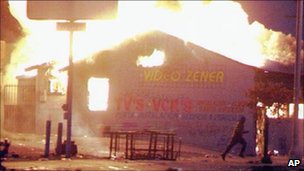You are here
What Los Angeles Can Teach the UK on Riot Control
Sun, 2011-08-21 23:44 — Kathy GilbeauxBBC News - August 12, 2011
 Widespread violence broke out across Los Angeles in 1992 following the Rodney King trial
Widespread violence broke out across Los Angeles in 1992 following the Rodney King trial
Prime Minister David Cameron is to consult US "supercop" Bill Bratton on how to deal with city rioting. Mr Bratton, the former New York and Los Angeles police chief, is credited with dramatically reducing crime after the 1992 riots in LA.
The burning buildings, looting, and clashes with police in Britain this week have brought back some vivid memories in Los Angeles.
In 1992, riots sparked by a row over racism spread across the city and for six days the fires burned and the violence raged.
Until a week ago they were the defining images of urban rioting etched on the public memory here and around the world.
Now David Cameron is turning to the man who is credited with restoring law and order in the city - former LAPD chief Bill Bratton - dubbed a "US Supercop" by the British newspapers.
Mr Bratton, having earlier served as the head of the NYPD in New York, took over the LAPD a decade after the 1992 riots.
At one point he was apparently being considered for the job as Britain's top policeman, the new Commissioner of London's Metropolitan police.
King verdict
"Looking at the pictures coming out of London really brings back memories of what happened here in Los Angeles 20 years ago," said Commander Andrew Smith, then a Los Angeles Police Department street officer.
He showed me a photograph taken on the day violence erupted in 1992 - a little faded but clearly showing him standing in the middle of the road holding a shotgun upright in one hand, burning buildings all around him.
"I see a lot of parallels with the behaviour of the rioters in London - they did the same things here then - and we learned a lot of lessons.
"One of the first things we did initially was to back off from the flashpoint of the riot, but we realised after a while we had to send in more cops and just have an overwhelming show of force and take a lot of people to jail."
That was a similar approach to that taken by British police in London.
The violence in LA was sparked by a court decision. A white jury acquitted four white police officers who had been videotaped badly beating Rodney King, an African American.
"The beating of Rodney King was simply the catalyst," said Joe Hicks, a former civil rights leader who led a multi-cultural organisation to help repair communities in the aftermath of the riots.
It began in a black neighbourhood but, as was the case in the United Kingdom, many different people joined the riot.
"They were Latinos, poor whites, they were just hooligans of all sorts hit the streets along with black gang members and all sorts of people out doing burning and looting and rioting and general thuggery on the streets of LA," he said.
"You get a lot of clowns and fools and idiots in any society, who are just laying in wait for the chance to do what they do."
Rioter's regrets
One of the gang members involved in the violence in South Central LA was Najee Ali who described how people were pulled from vehicles and beaten and how local grievances were settled with violence and vandalism.
"I'm sorry for what we did to this day. We set fire to innocent people's property - people who had worked hard to come to America and make a better life for themselves," he said.
"Some of them never recovered and that is something we can't repay. But they are doing the same in the UK right now - not realising what they are doing, and unfortunately they are going to regret what they did.
"At the end of the day random violence, rioting is not going to be the solution to address their problems and grievances."
The LAPD learned tactics like bringing in large numbers of police officers, and the national guard, making a huge number of arrests to show their strength.
But the police also went through a long period of soul-searching after the riots.
"Across the board we made changes in our police department, adding more officers - more women, more minorities, a lot more Hispanic officers to match the community make up," said the LAPD's Commander Smith.
"We have embraced community policing - we really work a lot more in partnership with the different communities and we do everything we can to keep things calm when bad things happen and make things better in any way we can.
"I think we are able to relate to the community a lot better now."

Recent Comments